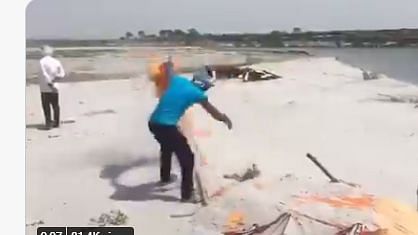The statement made by Union Minister of State for Health & Family Welfare Bharati Pravir Pawar in the Rajya Sabha on July 20 that ‘no deaths due to lack of oxygen have been specifically reported by states/UTs’ during the second wave of COVID led to nationwide outrage and a furore in political circles.
The Congress moved a breach of privilege motion against the Minister for allegedly misleading Parliament over deaths due to oxygen shortage during the second wave of the Covid-19 pandemic.
Rajya Sabha MP and senior Shiv Sena leader Sanjay Raut said he was "speechless" after hearing the Centre's reply in the Rajya Sabha. "I am speechless. What would happen to families of those who lost their loved ones due to oxygen shortage after hearing this statement? A case should be filed against the Central government. They are lying," Raut had said.
Delhi Health Minister Satyendar Jain said the entire country, including Delhi, reported deaths due to lack of oxygen and that the Centre is “completely wrong” in claiming that no one died due to lack of oxygen. “Won’t be surprised if tomorrow the Centre says COVID-19 never came to the country,” he said.
It has since emerged that guidelines had been issued to the states by Indian Council of Medical Research (ICMR)-National Centre for Disease Informatics and Research (NCDIR) in May, 2020, when the country was reeling under the first wave of COVID, which categorically said that medical conditions such as Asphyxia (respiratory arrest/failure), among others, should not be mentioned as ‘Cause of Death’.

The complete document, titled "Guidance for the appropriate recording of COVID-19 related deaths in India" can be read here, with the relevant portion appearing on Page 6.
The Indian Council of Medical Research is funded by Government of India through Union Ministry of Health & Family Welfare (MoHFW), while National Centre for Disease Informatics and Research serves as ‘an ethics advisory body to ICMR and Department of Health Research, MoHFW’, as per its website.
Speaking to National Herald, Dr. Ishwar Gilada, an infectious diseases expert who raised the alarm against HIV-AIDS in India back in 1985 and is serving as secretary-general of Organised Medicine Academic Guild (OMAG), a federation of 15 professional associations of post-graduate doctors in India, covering 250,000 consultants, said these guidelines virtually prevented states to report deaths caused by oxygen deprivation.
“The medical fraternity was shocked by the Minister’s statement because in a way, the blame falls on doctors. Nothing could be further away from the reality that the country witnessed in April and May 2021 when innumerable people died on roads, in cars, in ambulances, and even in hospitals due to a shortage of oxygen. But technically, the Minister was not wrong in saying that no death was reported due to shortage of oxygen because the death recording norms simply don’t allow doctors and hospitals to do so,” he said.
“When we report an individual’s death, we mention immediate cause of death in the first line and the antecedent cause of death in the second line that covers the name of the disease which caused the death. We also mention additional conditions, if any in the third line. This is the system that is being followed for issuing death certificates,” he said.
“We don’t report a lack of infrastructure or medicine etc as a cause of death. If a person died due to lack of oxygen or medicine, there is no system to report that,” he added.
“But the Minister could have expanded her statement a little more to state that though some people may have died due to the non-availability of oxygen, our death registry doesn't capture that kind of data," he said.
“Otherwise, her statement amounts to saying what the headline or movie title ‘No one killed Jessica’ said,” Dr Gilada added.“After all, it was the Centre which had asked for and received help from foreign governments and bodies in the form of oxygen supplies, oxgyen concentrators etc. If there was no shortage, why would it have done so?” he pointed out.
He said that autopsy reports too could have helped with such data, but in case of Covid-19 victims, hardly any autopsies are done due to fear. “At least a few representative post-mortems should have been done to guide the medical caregivers as well as the authorities. Asphyxia can be noted in post mortem findings in such cases,” he said.
Asked if the guidelines and reporting mechanism needed to be changed so that oxygen-related deaths in the third and any subsequent wave can be recorded, Dr Gilada said such ‘parallel information’ definitely needed to be included.
OMAG has sought a clarification from the ICMR on the statement made by the Minister in the Rajya Sabha.
































